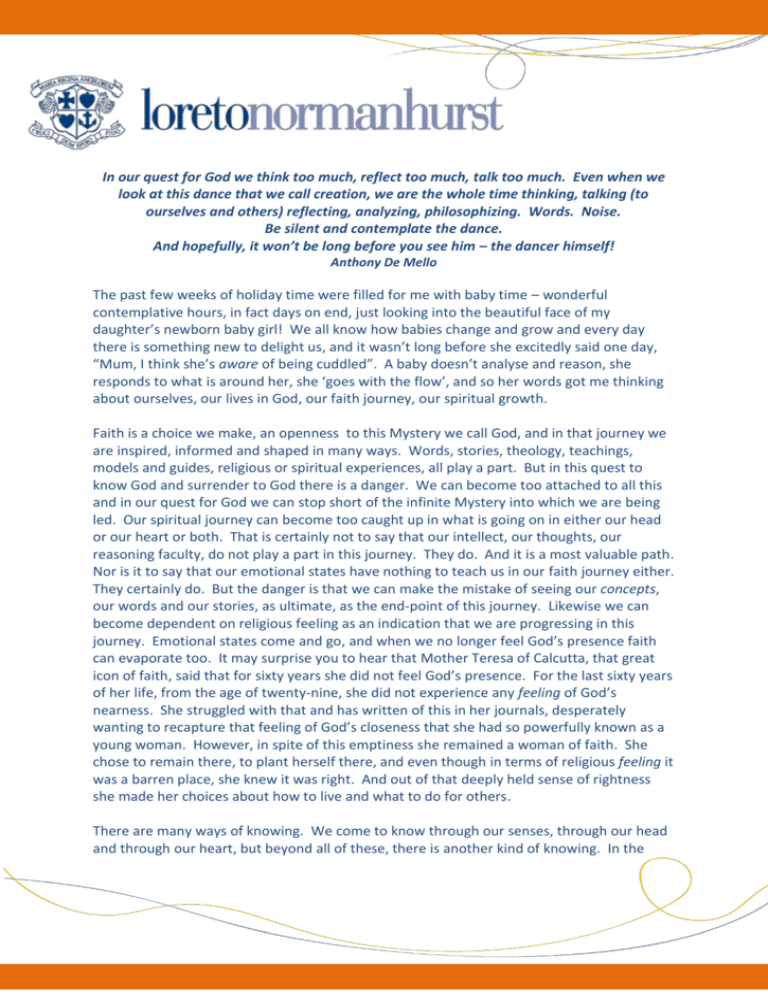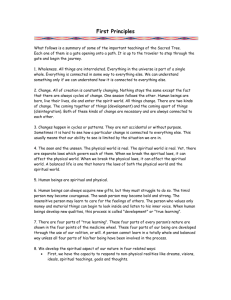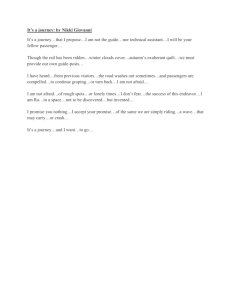In our quest for God we think too much, reflect too much, talk too
advertisement

In our quest for God we think too much, reflect too much, talk too much. Even when we look at this dance that we call creation, we are the whole time thinking, talking (to ourselves and others) reflecting, analyzing, philosophizing. Words. Noise. Be silent and contemplate the dance. And hopefully, it won’t be long before you see him – the dancer himself! Anthony De Mello The past few weeks of holiday time were filled for me with baby time – wonderful contemplative hours, in fact days on end, just looking into the beautiful face of my daughter’s newborn baby girl! We all know how babies change and grow and every day there is something new to delight us, and it wasn’t long before she excitedly said one day, “Mum, I think she’s aware of being cuddled”. A baby doesn’t analyse and reason, she responds to what is around her, she ‘goes with the flow’, and so her words got me thinking about ourselves, our lives in God, our faith journey, our spiritual growth. Faith is a choice we make, an openness to this Mystery we call God, and in that journey we are inspired, informed and shaped in many ways. Words, stories, theology, teachings, models and guides, religious or spiritual experiences, all play a part. But in this quest to know God and surrender to God there is a danger. We can become too attached to all this and in our quest for God we can stop short of the infinite Mystery into which we are being led. Our spiritual journey can become too caught up in what is going on in either our head or our heart or both. That is certainly not to say that our intellect, our thoughts, our reasoning faculty, do not play a part in this journey. They do. And it is a most valuable path. Nor is it to say that our emotional states have nothing to teach us in our faith journey either. They certainly do. But the danger is that we can make the mistake of seeing our concepts, our words and our stories, as ultimate, as the end-point of this journey. Likewise we can become dependent on religious feeling as an indication that we are progressing in this journey. Emotional states come and go, and when we no longer feel God’s presence faith can evaporate too. It may surprise you to hear that Mother Teresa of Calcutta, that great icon of faith, said that for sixty years she did not feel God’s presence. For the last sixty years of her life, from the age of twenty-nine, she did not experience any feeling of God’s nearness. She struggled with that and has written of this in her journals, desperately wanting to recapture that feeling of God’s closeness that she had so powerfully known as a young woman. However, in spite of this emptiness she remained a woman of faith. She chose to remain there, to plant herself there, and even though in terms of religious feeling it was a barren place, she knew it was right. And out of that deeply held sense of rightness she made her choices about how to live and what to do for others. There are many ways of knowing. We come to know through our senses, through our head and through our heart, but beyond all of these, there is another kind of knowing. In the Book of Psalms the psalmist counsels, “Be still and know that I am God”. This is much like a baby just being aware of being cuddled. It is a place where argument and concepts are put to rest. It is a place of listening and attentiveness, where we surrender to the initiative that is God’s. And that’s hard because it’s much easier to reason and argue and design lofty concepts. It is a place which may indeed feel barren and dry and empty. So much of our journey into God is about quietening those voices, quietening our minds, and not hankering after those consoling and uplifting spiritual feelings. This is a well-worn path in the spiritual journey and it is well-documented too. It is not uncommon to hear of the great mystics and saints in all traditions writing of this journey into darkness, the place where religious feeling evaporates and religious thoughts become obstacles to spiritual growth. And that journey is indeed a gift. It’s nothing less than shattering the idols. Paradoxically our thoughts and reason, the concepts and understandings that are so life-giving and provide us with insight and wisdom, can also become the idols we cling to. Our concepts of God can replace God. There is a saying (sometimes attributed to the French philosopher Voltaire) that the Book of Genesis tells us that God made humans in God’s image and that ever since we have been returning the favour! How true and what a trap. We are all only too painfully aware of what havoc is wreaked when people become utterly wedded to particular concepts of God and set themselves up as spokespersons for the Divine. And yes, the problem is that we project the very best but also the very worst of ourselves onto God and indeed do ‘make God’ in our own image and likeness. No wonder the psalmist said, “Be still and know that I am God”. Anthony De Mello, the Indian Jesuit spiritual teacher, tells this story: “In the Gospel of John we read: ‘The Word became flesh; he came to dwell among us … through him all things came to be, no single thing was created without him. All that came to be was alive with his life, and that life was the light of all people. The light shines on in the dark, and the darkness has never quenched it’. Look steadily at the darkness. It won’t be long before you see the light. Gaze at things. It won’t be long before you see the Word. The Word became flesh; he came to dwell among us … And stop those frantic efforts to change flesh back into words. Words, words, words!” God is with us, among us, within us, beyond us. God is closer to us than we are to ourselves, as the mystical tradition affirms. Rest in that. Our experience of God needs to be ‘fleshy’ and real in the sense that God is not a concept. God is Reality. Know that. Trust it and surrender to it. There is another saying from the Eastern traditions: “When the Master points to the moon all the disciples see is the finger pointing”. The pointing finger, the concepts, the theology, can serve us very well up to a point. But we need to make the end of our quest God, and not stop at concepts of God, talk about God. An idol is something that takes the place of the real thing and if we hold on to the idol, if we make our concepts the real thing, we will always fall short of the Reality. This humble acknowledgement that we can never have the defining word on God is expressed in one strand of our spiritual tradition known as the apophatic way. It is also known as negative theology or the via negativa. God is described in terms of what God is not: God is not this, God is not that. In other words, God can never be exhausted by our concepts. It begins with a stance of trust, that God’s Presence saturates all things and that to attempt to make definitive claims about this Presence cannot be anything but limiting and ultimately will create idols. Saint Cyril of Jerusalem in his Catechetical Homilies says: “For we explain not what God is but candidly confess that we have not exact knowledge concerning Him. For in what concerns God to confess our ignorance is the best knowledge”. Another wonderful De Mello story captures the wisdom of this apophatic tradition: “The mystic was back from the desert. ‘Tell us’, they said, ‘what God is like’. But how could he ever tell what he had experienced in his heart? Can God be put into words? He finally gave them a formula – so inaccurate, so inadequate – in the hope that some of them might be tempted to experience it for themselves. They seized upon the formula. They made it a sacred text. They imposed it on others as a holy belief. They went to great pains to spread it in foreign lands. Some even gave their lives for it. The mystic was sad. It might have been better if he had said nothing”. Well doesn’t this ring true! Formulae, imposing perspectives, fanatical dedication to particular concepts, happen in all traditions. Religious coercion and fanaticism are all too evident in our world. And without fail the god so presented is the god of human projection. Our concepts and our egos take over. Authentic spiritual growth, on the other hand, is characterized as growth by God’s spirit. It is a growth into maturity and freedom from various kinds of dependency and slavery and, as the little story above illustrates, on the spiritual journey we can certainly become very dependent on concepts and emotional states. However, the genuine path is to be grateful for the experiences, the gifts, but to be left with an even greater hunger for God, a hunger to continue our search, to go beyond our experiences, to see them for what they are, steps on the way that, like the finger pointing to the moon, may at best only do that – point the way. All particular feelings, images and concepts of God are only finite reflections of the Divine. God’s Being cannot be ultimately grasped by the intellect, imagination or any other sense. We can so easily stop at some created good and become attached to it and if this happens anything can take the place of God and become an idol. Even spiritual experiences in prayer can become a problem. We can end up primarily loving the gifts of God and not God, the giver of these gifts. St John of the Cross, the sixteenth century Spanish mystic, speaks of God’s spirit liberating us from such attachments and leading us into the exercise of our spirit, rather than the exercise of our intellect or feelings, and thus into a communion with God that is more abundant and freer of imperfections. In his work, Ascent of Mount Carmel, John writes: “The more spiritual a man is, the more he discontinues trying to make particular acts with his faculties, for he becomes engrossed in one general, pure act, a calm and repose of interior quietude. The soul would want to remain in that unintelligible peace as in its right place. Since people do not understand the mystery of that new experience, they imagine themselves to be idle and doing nothing. They must learn to abide in that quietude with a loving attentiveness to God. At this stage the faculties are at rest and do not work actively but passively, by receiving what God is effecting in them”. The baby, aware of being cuddled, surrendering to it. Be still and know that I am God Possibly the greatest work ever written about this is the anonymous, late fourteenth century, The Cloud of Unknowing. In this work the author makes the point that God cannot be ultimately known through intellection and that thoughts must be left beneath a cloud of forgetting and unknowing. Well, what can we do? Love, he says, is the proper response, and will take us through that unknowing into a knowing of God: “For He can well be loved but he cannot be thought. By love He can be grasped and held, but by thought, neither grasped nor held. And therefore, though it may be good at times to think specifically of the kindness and excellence of God, and though this may be a light and a part of contemplation, all the same in the work of contemplation itself, it must be cast down and covered with a cloud of forgetting. And you must step above it, stoutly but deftly, with a devout and delightful stirring of love, and struggle to pierce that darkness above you; and beat on that thick cloud of unknowing with a sharp dart of longing love, and do not give up, whatever happens”. Aren’t his words just wonderful – ‘stoutly but deftly’ and ‘with a devout and delightful stirring of love’. Sitting and loving. Let the ‘noise’ within fall silent. As John of the Cross wrote in his beautiful poem, The Dark Night (not to be confused with the ‘dark night of the soul’ – this is something different that John also wrote about), “One dark night, fired with love’s urgent longings, I went out, my house being now all stilled … ”. As we give ourselves over to this practice we can be sure that slowly, over time, we will be free of the idols and will give God the space to really be God! And one more De Mello story to ponder and inspire: “The disciples were full of questions about God. Said the master, ‘God is the Unknown and the Unknowable. Every statement about him, every answer to your questions, is a distortion of the truth’. The disciples were bewildered. ‘Then why do you speak about him at all?’ ‘Why does the bird sing?” said the master. Not because it has a statement but because it has a song. The words of the scholar are to be understood. The words of the master are not to be understood. They are to be listened to as one listens to the wind in the trees and the sound of the river and the song of the bird. They will awaken something within the heart that is beyond all knowledge”. Ms Kerry McCullough Dean of Mission





